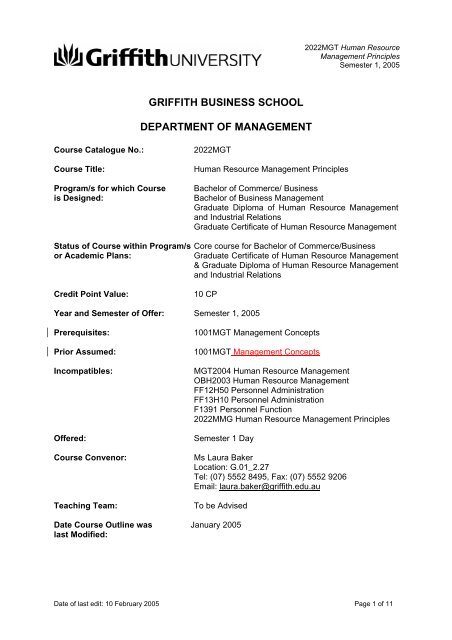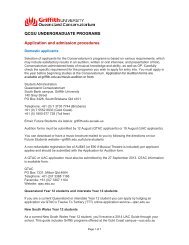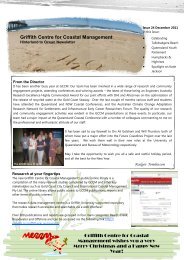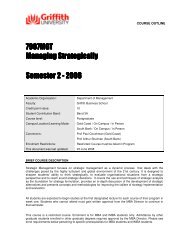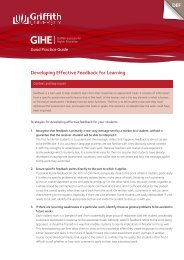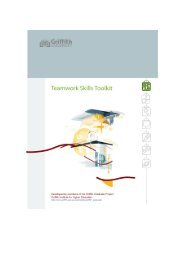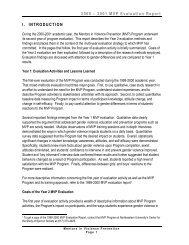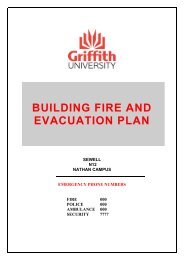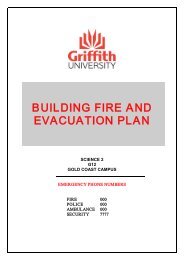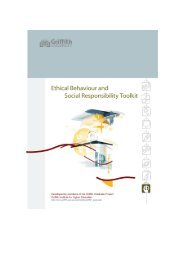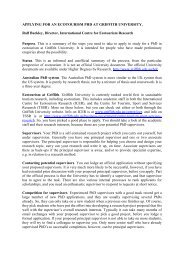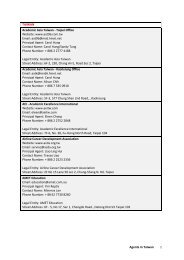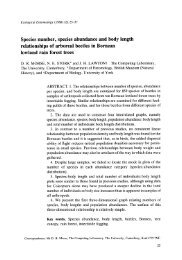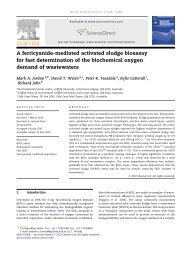griffith business school department of management - Griffith University
griffith business school department of management - Griffith University
griffith business school department of management - Griffith University
Create successful ePaper yourself
Turn your PDF publications into a flip-book with our unique Google optimized e-Paper software.
2022MGT Human Resource<br />
Management Principles<br />
Semester 1, 2005<br />
GRIFFITH BUSINESS SCHOOL<br />
DEPARTMENT OF MANAGEMENT<br />
Course Catalogue No.:<br />
Course Title:<br />
Program/s for which Course<br />
is Designed:<br />
2022MGT<br />
Human Resource Management Principles<br />
Bachelor <strong>of</strong> Commerce/ Business<br />
Bachelor <strong>of</strong> Business Management<br />
Graduate Diploma <strong>of</strong> Human Resource Management<br />
and Industrial Relations<br />
Graduate Certificate <strong>of</strong> Human Resource Management<br />
Status <strong>of</strong> Course within Program/s Core course for Bachelor <strong>of</strong> Commerce/Business<br />
or Academic Plans:<br />
Graduate Certificate <strong>of</strong> Human Resource Management<br />
& Graduate Diploma <strong>of</strong> Human Resource Management<br />
and Industrial Relations<br />
Credit Point Value:<br />
10 CP<br />
Year and Semester <strong>of</strong> Offer: Semester 1, 2005<br />
Prerequisites:<br />
Prior Assumed:<br />
Incompatibles:<br />
Offered:<br />
Course Convenor:<br />
Teaching Team:<br />
1001MGT Management Concepts<br />
1001MGT Management Concepts<br />
MGT2004 Human Resource Management<br />
OBH2003 Human Resource Management<br />
FF12H50 Personnel Administration<br />
FF13H10 Personnel Administration<br />
F1391 Personnel Function<br />
2022MMG Human Resource Management Principles<br />
Semester 1 Day<br />
Ms Laura Baker<br />
Location: G.01_2.27<br />
Tel: (07) 5552 8495, Fax: (07) 5552 9206<br />
Email: laura.baker@<strong>griffith</strong>.edu.au<br />
To be Advised<br />
Date Course Outline was January 2005<br />
last Modified:<br />
Date <strong>of</strong> last edit: 10 February 2005 Page 1 <strong>of</strong> 11
2022MGT Human Resource<br />
Management Principles<br />
Semester 1, 2005<br />
1. OBJECTIVES<br />
At the completion <strong>of</strong> this course, students should be able to:<br />
• Understand the principal roles, functions and outcomes <strong>of</strong> HRM in organisations<br />
• Critically analyse the research literature concerning HRM<br />
• Use oral and written communication skills at the individual and group levels<br />
• Understand the role <strong>of</strong> HRM in the current <strong>business</strong> environment<br />
• Determine appropriate recruitment and selection techniques<br />
• Develop and evaluate different approaches to performance <strong>management</strong><br />
• Develop an understanding <strong>of</strong> HRM in an EEO and diversity <strong>management</strong> context<br />
• Understand strategic links between HRM and industrial relations and occupational<br />
health and safety<br />
• Evaluate the use <strong>of</strong> compensation and incentive payment schemes<br />
2. INTERRELATIONSHIP OF THE COURSE WITH OTHER COURSE/S AND<br />
PROGRAM/S<br />
The course complements first year <strong>management</strong> and communication courses. It further<br />
develops the conceptual, communication and critical analysis skills acquired in these<br />
courses. The HRM Principles course is essential for those students wishing to undertake<br />
study in the Human Resource Management field.<br />
3. BRIEF DESCRIPTION<br />
The primary emphasis <strong>of</strong> this course is the <strong>management</strong> <strong>of</strong> human resources in<br />
organisations. A central theme throughout this course is the contribution <strong>of</strong> Human Resource<br />
Management (HRM) to the efficiency and productivity <strong>of</strong> organisations. The course delivery<br />
will balance theoretical developments in HRM with practical and strategic considerations <strong>of</strong><br />
the <strong>management</strong> <strong>of</strong> diverse people in the work place and its surrounding environment.<br />
4. COURSE CONTENT<br />
WEEK THEME/TOPIC ASSESSMENT<br />
1 • Overview <strong>of</strong> course outline<br />
28 Feb • Introduction to HRM<br />
2<br />
7 Mar<br />
3<br />
14 Mar<br />
4<br />
21 Mar<br />
• The strategic role <strong>of</strong> HRM<br />
• Strategic human resource planning<br />
• Human resource information systems<br />
• Equal employment opportunity<br />
• Job analysis<br />
• Job design<br />
MID-SEMESTER BREAK 25/03/05 – 03/04/05<br />
5<br />
4 Apr<br />
• Recruitment<br />
ASSESSMENT DUE –Research Assignment – “Group<br />
developed research plan” to be handed in to OCAHS by<br />
5 p.m. Friday 8 th April<br />
RESEARCH PLAN<br />
Date <strong>of</strong> last edit: 10 February 2005 Page 2 <strong>of</strong> 11
2022MGT Human Resource<br />
Management Principles<br />
Semester 1, 2005<br />
WEEK THEME/TOPIC ASSESSMENT<br />
6<br />
• Employee selection<br />
11 Apr<br />
7<br />
18 Apr<br />
• Performance <strong>management</strong><br />
8 No lecture or tutorials due to ANZAC Day holiday<br />
9<br />
3 May<br />
10<br />
9 May<br />
11<br />
16 May<br />
12<br />
23 May<br />
13<br />
30 May<br />
• Human resource development<br />
• Managing careers<br />
• Motivation<br />
• Employee compensation<br />
ASSESSMENT DUE – Research Assignment –<br />
“Individual research description and analysis” to be<br />
handed into OCAHS 5 p.m. on Friday 13 th May<br />
• Employee relations<br />
• Occupational health and safety<br />
• Managing diversity<br />
• International HRM<br />
• Evaluating HRM in the organisation<br />
• Wrap up<br />
RESEARCH<br />
ASSIGNMENT<br />
GROUP<br />
PRESENTATIONS<br />
GROUP<br />
PRESENTATIONS<br />
GROUP<br />
PRESENTATIONS<br />
GROUP<br />
PRESENTATIONS<br />
5. GENERIC SKILLS DEVELOPMENT<br />
The <strong>Griffith</strong> Graduate<br />
Resource Directory for Generic Skills Development<br />
The <strong>Griffith</strong><br />
Graduate<br />
Personal<br />
Effectiveness<br />
Pr<strong>of</strong>essional<br />
Effectiveness<br />
Career & Vocational<br />
Skills<br />
Organisational<br />
Membership Skills<br />
Community &<br />
Citizenship Skills<br />
Team Work<br />
Oral Communication<br />
Written<br />
Communication<br />
Information Skills<br />
Interpersonal Skills<br />
Self Management<br />
Skills<br />
Adaptability &<br />
Learning Skills<br />
Problem Solving &<br />
Decision Making<br />
Conceptual &<br />
Analytical Skills<br />
From the <strong>Griffith</strong> Graduate Matrix, this course will place particular emphasis on the<br />
areas shaded in the model above.<br />
Date <strong>of</strong> last edit: 10 February 2005 Page 3 <strong>of</strong> 11
2022MGT Human Resource<br />
Management Principles<br />
Semester 1, 2005<br />
Four content and seven skill-based competencies will be developed throughout the<br />
course.<br />
1. Introducing HRM<br />
CONTENT AREAS<br />
Perspectives <strong>of</strong> HRM:<br />
Introduction to HRM<br />
Strategic HRM<br />
Changing dynamics <strong>of</strong> work<br />
2. Selecting the best employee<br />
Acquiring Human Resources:<br />
HR planning and recruitment<br />
Employee selection techniques<br />
Assessing Work and Work Outcomes:<br />
Job analysis<br />
Work design<br />
3. Managing the Internal and External<br />
Environments<br />
External environment:<br />
EEO, HRM and industrial relations<br />
HRM and occupational health and safety<br />
International HRM<br />
Internal environment:<br />
Work, family, and diversity<br />
Information <strong>management</strong> systems<br />
4. Training and Rewarding the employee<br />
Developing Human Resources:<br />
Training and educating employees<br />
Career development for employees<br />
Compensating Human Resources:<br />
Performance <strong>management</strong> systems<br />
Compensation and incentive plans<br />
SKILLS<br />
1. Oral communication<br />
Communicating ideas in tutorials and<br />
presentations<br />
Persuading peers<br />
2. Written Communication<br />
Formulating answers to case studies<br />
Developing short answers to questions<br />
Completing assessment essay<br />
Completing exam questions<br />
3. Conceptual and Analytical Skills<br />
Analysing research findings<br />
Developing research plan<br />
Applying theory to practice<br />
Developing links between HRM concepts<br />
4. Team work<br />
Implementing presentation with peers<br />
Using leadership and group skills during<br />
group work<br />
5. Interpersonal skills<br />
Discussing ideas with peers in groups<br />
Developing and maintaining effective working<br />
relationships with peers<br />
6. Problem solving and decision making<br />
Developing research plan<br />
Using problem solving skills during workshop<br />
case studies<br />
7. Information skills<br />
Identify, access, retrieve, evaluate and utilise<br />
a range <strong>of</strong> HRM literature for assessment<br />
Date <strong>of</strong> last edit: 10 February 2005 Page 4 <strong>of</strong> 11
2022MGT Human Resource<br />
Management Principles<br />
Semester 1, 2005<br />
6. FLEXIBLE LEARNING<br />
While attendance at the lectures and tutorial workshops is highly recommended, students are<br />
encouraged to learn at their own pace and ability. This is facilitated by a dedicated course<br />
web site from which lecture notes and course related notices from the teaching staff can be<br />
downloaded. The publisher <strong>of</strong> the prescribed textbook also provides web enabled learning<br />
resources, such as self-exercises, topic summaries, power point slides and links to latest<br />
developments in the HRM field. Assessment items can be tailored to suit individual needs<br />
and circumstances.<br />
7. ORGANISATION AND TEACHING METHODS<br />
COMPONENT<br />
CONTACT HOURS<br />
Lectures:<br />
All campuses 2 hours per week (weeks 1 – 13)<br />
Tutorials:<br />
Gold Coast<br />
1 hour per week (weeks 2 – 7, 9 – 13)<br />
Nathan and Logan<br />
2 hours fortnightly<br />
8. ASSESSMENT<br />
All activities in the course are compulsory. The assessment is based on an understanding <strong>of</strong><br />
all components <strong>of</strong> the course.<br />
ITEM LENGTH %WEIGHTING DUE DATE<br />
Research Assignment: Written<br />
Group developed research plan<br />
250 words<br />
(5%)<br />
Week 5<br />
Individual research description and<br />
analysis<br />
2500 words<br />
(45%)<br />
Week 10<br />
Research Assignment: Oral<br />
Group presentation <strong>of</strong> research<br />
assignment 15 minutes 5% Weeks 10 -13 for<br />
presentations<br />
Tutorial Participation<br />
Workshop attendance 5% Weeks 2 - 13<br />
Final Examination<br />
Questions on topics covered in<br />
lectures from weeks 1 - 13<br />
2 hours 40% End <strong>of</strong> Semester<br />
Exam Period<br />
Date <strong>of</strong> last edit: 10 February 2005 Page 5 <strong>of</strong> 11
2022MGT Human Resource<br />
Management Principles<br />
Semester 1, 2005<br />
As assessment items are designed to examine understanding and/or application <strong>of</strong> the<br />
course’s learning objectives, non submission <strong>of</strong> a piece <strong>of</strong> assessment will result in a failure<br />
to demonstrate mastery <strong>of</strong> these learning objectives and may therefore incur a fail grade for<br />
the course.<br />
• The research assignment evaluates the student's ability to engage in and critically<br />
analyse research, and develop problem solving and decision making skills. It<br />
facilitates the application <strong>of</strong> HRM knowledge within a practical organisational setting<br />
through a research project. The group component aims to develop the student’s<br />
interpersonal, team work and oral communication skills.<br />
• The tutorial workshop evaluates the student’s knowledge, understanding and<br />
synthesis <strong>of</strong> Human Resource Management principles. It facilitates the transference<br />
<strong>of</strong> knowledge and experiences in a workshop setting. The tutorial workshop aims to<br />
develop the student’s conceptual, analytic, and oral communication skills.<br />
• A final examination will assess the students understanding, application and critical<br />
analysis <strong>of</strong> Human Resource Management in a controlled environment.<br />
In MGT undergraduate courses where a final examination is set, students must achieve a<br />
minimum <strong>of</strong> 40% in the final exam in order to pass the course.<br />
SKILL AREA<br />
Oral<br />
Communication<br />
Written<br />
Communication<br />
Conceptual &<br />
Analytical Skills<br />
RESEARCH<br />
ASSIGNMENT<br />
(INDIVIDUAL<br />
PART)<br />
RESEARCH<br />
ASSIGNMENT<br />
(GROUP<br />
PART)<br />
TUTORIAL<br />
PARTICIPATION<br />
AND<br />
PRESENTATION<br />
<br />
EXAM<br />
<br />
<br />
Teamwork <br />
Interpersonal<br />
Skills<br />
Problem Solving<br />
& Decision<br />
Making<br />
Information skills <br />
<br />
<br />
Research Assignment<br />
All components <strong>of</strong> this assignment are designed to develop a practitioner’s perspective in<br />
managing HR. Students are expected to critically evaluate an HRM activity or function in a<br />
real organisation and to make specific recommendations for improvement. Further details will<br />
be provided to students in first week.<br />
Workshop participation and research assignment presentation<br />
The tutorials take the form <strong>of</strong> workshops focusing on important aspects <strong>of</strong> HRM. The<br />
workshops are conducted in an experiential learning environment and participation in these<br />
exercises is crucial to the understanding <strong>of</strong> the course.<br />
<br />
Date <strong>of</strong> last edit: 10 February 2005 Page 6 <strong>of</strong> 11
2022MGT Human Resource<br />
Management Principles<br />
Semester 1, 2005<br />
Both a) participation in workshops and b) the research assignment presentation attracts<br />
10 marks. Research assignment presentations are compulsory for all students. Students<br />
need to be present for the entire duration <strong>of</strong> the workshop to receive a mark for participation.<br />
Non-attendance at tutorials and failure to present research assignment without appropriate<br />
documentation (eg. Medical certificate) will result in zero marks for each. Work commitments<br />
are not accepted as reasonable grounds for non-attendance at workshops and<br />
non-presentation <strong>of</strong> research assignment.<br />
Final Examination<br />
The examination is designed to assess students’ understanding <strong>of</strong> the practical applications<br />
<strong>of</strong> theories and concepts presented during lectures and workshops weeks 1-13 inclusive.<br />
9. TEXTS AND SUPPORTING MATERIALS<br />
Prescribed text:<br />
Wiesner, R., & Millet, B. (2003). Human Resource Management: Challenges and<br />
Future Directions. John Wiley & Sons: Milton.<br />
* Chapter-wise references will be provided in lecture notes.<br />
Other Recommended Texts:<br />
De Cieri, H., & Kramar, R. (2003). Human Resource Management in Australia:<br />
Strategy, people, performance, McGraw Hill: Sydney.<br />
Dessler, G., <strong>Griffith</strong>s, J., Lloyd-Walker, B., & Williams, A. (1999). Human Resource<br />
Management. Sydney: Prentice Hall Australia.<br />
Kramer, R., McGraw, P. & Schuler, R. (1997). Human Resource Management in<br />
Australia. (3 rd Edition). Melbourne: Longman.<br />
Nankervis, A. R., Compton, R. L., & McCarthy, T. E. (1999). Strategic Human<br />
Resource Management (3 rd Ed.). Melbourne: Nelson ITP.<br />
Nankervis, A. R., Compton, R. L., & Baird, M. (2002). Strategic Human Resource<br />
Management (4th Ed.). Melbourne: Nelson Thomson.<br />
O’Neill, G. L. & Kramar, R. (Eds.). (1995). Australian Human Resources<br />
Management: Current trends in <strong>management</strong> practice. Melbourne: Pitman Publishing.<br />
Stone, R. J. (Ed.). (1994). Readings in Human Resource Management (Vol 2),<br />
Brisbane: John Wiley and Sons.<br />
Stone, R. J. (Ed.). (1998). Readings in Human Resource Management (Vol 3),<br />
Brisbane: John Wiley & Sons.<br />
Date <strong>of</strong> last edit: 10 February 2005 Page 7 <strong>of</strong> 11
2022MGT Human Resource<br />
Management Principles<br />
Semester 1, 2005<br />
Journal Titles And Data Bases<br />
Students are strongly advised to refer to the following databases and e-journals (electronic<br />
periodicals) available on <strong>Griffith</strong> library web pages for a comprehensive and current literature<br />
review<br />
ELECTRONIC JOURNALS TITLES<br />
You can access HRM related e-journals at<br />
http://www.gu.edu.au/ins/collections/ejournal/<br />
Academy <strong>of</strong> Management Journal<br />
Academy <strong>of</strong> Management Review<br />
Academy <strong>of</strong> Management Executive<br />
Asia Pacific Journal <strong>of</strong> Human Resource<br />
Management<br />
Employment Relations Today<br />
Group and Organisational Studies<br />
Gender, Work and Organisation<br />
Gender, Place and Culture<br />
Human Relations<br />
Human Resource Management<br />
Human Resource Development Quarterly<br />
Human Resource Planning<br />
HRMagazine<br />
International Journal <strong>of</strong> Human Resource<br />
Management<br />
Industrial Relations Journal<br />
International Review <strong>of</strong> Industrial and<br />
Organisational Psychology<br />
International Journal <strong>of</strong> Selection and<br />
Assessment<br />
Journal <strong>of</strong> Applied Psychology<br />
Journal <strong>of</strong> Human Resources<br />
Journal <strong>of</strong> Managerial Issues<br />
Journal <strong>of</strong> Occupational Behaviour<br />
Journal <strong>of</strong> Occupational Psychology<br />
DATA BASES<br />
Also try<br />
http://www.gu.edu.au/ins/lcollections/databases/<br />
compdir/<br />
Following is a selection <strong>of</strong> HRM-related data<br />
bases:<br />
• Australian Human Resources Management<br />
• Human Resource Management<br />
• ABI Inform Global<br />
• MCB <strong>University</strong> Press e-journals (Emerald<br />
Library)<br />
Note: While searching the databases, refer only<br />
to publications in quality journals, such as<br />
the ones mentioned to the left.<br />
Journal <strong>of</strong> Organisational Psychology<br />
Organisation Dynamics<br />
Personnel<br />
Personnel Administrator<br />
Personnel Management<br />
Personnel Psychology<br />
Personnel Review<br />
Public Personnel Management<br />
Research in Personnel and Human Resource<br />
Management<br />
Training and Development in Australia<br />
Date <strong>of</strong> last edit: 10 February 2005 Page 8 <strong>of</strong> 11
2022MGT Human Resource<br />
Management Principles<br />
Semester 1, 2005<br />
HRM-Related Web Sites<br />
• http://www.ahri.com.au<br />
Home page <strong>of</strong> Australian Human Resource Institute (AHRI). You can access<br />
Asia-Pacific Journal <strong>of</strong> Human Resource Management, published by AHRI, from<br />
this site. Members <strong>of</strong> AHRI can also access Global Village from this site.<br />
AHRI is the pr<strong>of</strong>essional body for HR pr<strong>of</strong>essionals in Australia and <strong>of</strong>fers a range<br />
<strong>of</strong> membership services, such as pr<strong>of</strong>essional accreditation, conferences,<br />
seminars, workshops, network meetings and online discussion forums. Students<br />
interested in a career in HR are recommended to become a student member <strong>of</strong><br />
AHRI. Please visit the web site on how to become a member.<br />
• http://www.shrm.org/<br />
This is the (U.S.) Society for Human Resource Management (SHRM) home page.<br />
10. SCOPE OF COURSE EVALUATION<br />
This course will be evaluated through surveys run by the School in accordance with<br />
<strong>University</strong> and Faculty policy.<br />
11. ADMINISTRATION<br />
Submission <strong>of</strong> Assignments<br />
Assignments should be submitted according to the Course Convenor’s instructions by the<br />
due date. All students should keep a copy <strong>of</strong> their assignment until it is marked and returned<br />
to them. Assignments should be kept until a final grade is awarded.<br />
Learning Assistance Unit<br />
The Learning Assistance Unit (LAU) provides free learning assistance services to <strong>Griffith</strong><br />
<strong>University</strong> students. This includes help with writing assignments, developing effective writing<br />
strategies, critical thinking, exam preparation, and much more. To find out more about the<br />
range <strong>of</strong> resources and study skills programs visit the website at<br />
http://www.gu.edu.au/ins/lils/lau/home.html or call in to the <strong>of</strong>fices.<br />
Alternatively you can e-mail at lau@<strong>griffith</strong>.edu.au or phone a friendly learning adviser on any<br />
<strong>of</strong> the numbers listed on the web site.<br />
12. COURSE COMMUNICATIONS<br />
All information required by the students will be communicated directly via lectures, and<br />
tutorials. This information will be duplicated on the course website. Please consult this site<br />
regularly and before you address any inquiry to the teaching staff.<br />
Specific assessment inquiries and issues <strong>of</strong> a personal nature may be addressed during<br />
consultation with staff. Issues <strong>of</strong> an administrative nature are best addressed via email or<br />
telephone.<br />
Date <strong>of</strong> last edit: 10 February 2005 Page 9 <strong>of</strong> 11
2022MGT Human Resource<br />
Management Principles<br />
Semester 1, 2005<br />
13. UNIVERSITY POLICIES<br />
13.1 Late Submission <strong>of</strong> Assignments<br />
Requests for an extension <strong>of</strong> time for submission <strong>of</strong> an assessment item must be lodged<br />
before the due date for the assessment item. Requests received on or after the due date<br />
will only be considered in exceptional circumstances. Extension requests must be made in<br />
writing to the Course Convenor, and be accompanied by appropriate supporting<br />
documentation.<br />
Where an extension has not been granted, an assessment item submitted after the due<br />
date will be penalised as follows: the mark awarded to the item will be reduced by 10% <strong>of</strong><br />
the maximum possible mark for each day that the assessment item is late. Each weekend<br />
(from Friday to Sunday) will count as one day.<br />
13.2 Plagiarism / Academic Misconduct<br />
Students must conduct their studies at the <strong>University</strong> honestly, ethically and in accordance<br />
with accepted standards <strong>of</strong> academic conduct. Any form <strong>of</strong> academic conduct which is<br />
contrary to these standards is academic misconduct for which the <strong>University</strong> may penalise<br />
a student. Specifically it is academic misconduct for a student to:<br />
<br />
<br />
<br />
<br />
<br />
present copied, falsified or improperly obtained data as if it were the result <strong>of</strong> laboratory<br />
work, field trips or other investigatory work;<br />
include in the student's individual work material which is the result <strong>of</strong> significant<br />
assistance from another person if that assistance was unacceptable according to the<br />
instructions or guidelines for that work;<br />
assist another student in the presentation <strong>of</strong> that student's individual work in a way that<br />
is unacceptable according to the instructions or guidelines for that work;<br />
cheat; (Cheating is dishonest conduct in assessment);<br />
plagiarise; (Plagiarism is knowingly presenting the work or property <strong>of</strong> another person<br />
as if it were one's own.)<br />
On determination that academic misconduct has taken place, the penalty which may be<br />
imposed on the student is one or more <strong>of</strong> the following:<br />
a. a reduced or nil result for the assessment item affected by the academic misconduct;<br />
b. a fail grade for the course in which academic misconduct occurred;<br />
c. exclusion from enrolment in the program for a specified period;<br />
d. exclusion from the program; readmission to the program is at the discretion <strong>of</strong> the<br />
Faculty based on consideration <strong>of</strong> the student's case for readmission.<br />
Where a student has been found guilty <strong>of</strong> academic misconduct on more than one<br />
occasion and has previously been penalised as set out in above a. - c., the penalty shall<br />
normally be exclusion from the program as set out in d., unless in the opinion <strong>of</strong> the<br />
relevant Assessment Board there are mitigating circumstances.<br />
Date <strong>of</strong> last edit: 10 February 2005 Page 1 <strong>of</strong> 11
2022MGT Human Resource<br />
Management Principles<br />
Semester 1, 2005<br />
Further information on this policy can be found in full at the following web address:<br />
http://www62.gu.edu.au/policylibrary.nsf<br />
13.3 Assessment Policy<br />
This policy outlines the philosophy <strong>of</strong> assessment, the assessment requirements <strong>of</strong> a<br />
course, the award <strong>of</strong> grades, information on special consideration, supplementary and<br />
deferred assessment, the conduct <strong>of</strong> students in examinations and the notification <strong>of</strong><br />
results. This policy also includes information on appealing grades (review <strong>of</strong> grade<br />
application), disposal <strong>of</strong> non-collected assessment material and roles and<br />
responsibilities <strong>of</strong> Course Convenors and Faculty Assessment Boards. This policy can<br />
be found in full at the following web address: http://www62.gu.edu.au/policylibrary.nsf<br />
13.4 Student Appeals and Grievances Policy<br />
<strong>Griffith</strong> <strong>University</strong> is committed to an equitable and enriching environment for students<br />
which fosters academic achievement and where the interactions amongst students and<br />
staff are based on mutual respect, fairness and fulfilment <strong>of</strong> obligations. The<br />
<strong>University</strong>'s Student Charter expresses the expectations which students may have <strong>of</strong><br />
the <strong>University</strong> and which the <strong>University</strong> has <strong>of</strong> its students. The Student Charter,<br />
together with the rules and policies <strong>of</strong> the <strong>University</strong>, provide the framework for the<br />
interaction between the <strong>University</strong>, its staff and students. This policy provides the<br />
mechanism for resolving problems when a student considers that a decision <strong>of</strong> the<br />
<strong>University</strong> or one <strong>of</strong> its staff or a situation experienced by the student is not in<br />
accordance with the expectations set down in the Student Charter or the <strong>University</strong>'s<br />
rules and policies.<br />
Section 2.1 <strong>of</strong> this policy provides students with information on how to best resolve<br />
certain grievances, eg. the awarding <strong>of</strong> a final grade, appealing a penalty imposed for<br />
academic misconduct, appealing academic probation or exclusion decisions, or refusal<br />
to award a deferred exam etc. This policy can be found in full at the following web<br />
address: http://www62.gu.edu.au/policylibrary.nsf<br />
Date <strong>of</strong> last edit: 10 February 2005 Page 1 <strong>of</strong> 11


